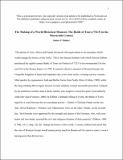Files in this item
The making of a world historical moment : the Battle of Tours (732/3) in the nineteenth century
Item metadata
| dc.contributor.author | Palmer, James T. | |
| dc.date.accessioned | 2020-07-16T23:34:54Z | |
| dc.date.available | 2020-07-16T23:34:54Z | |
| dc.date.issued | 2019 | |
| dc.identifier | 252171930 | |
| dc.identifier | 30536b7d-92df-490e-b80c-0ff5330a5328 | |
| dc.identifier | 000475979300008 | |
| dc.identifier | 85069518617 | |
| dc.identifier.citation | Palmer , J T 2019 , ' The making of a world historical moment : the Battle of Tours (732/3) in the nineteenth century ' , postmedieval: a journal of medieval cultural studies , vol. 10 , no. 2 , pp. 206-218 . https://doi.org/10.1057/s41280-019-00126-y | en |
| dc.identifier.issn | 2040-5960 | |
| dc.identifier.other | ORCID: /0000-0002-1933-0670/work/59698722 | |
| dc.identifier.uri | https://hdl.handle.net/10023/20274 | |
| dc.description.abstract | The Battle of Tours (or Poitiers) in 732/3 is frequently cited as a turning point in world history, when the advance of Muslim Arabs was decisively halted by the Christian army of Frankish mayor Charles Martel. Yet the battle and its reputation seem relatively modest in the earliest sources, with little sense that conquest or religious tensions were key issues. This paper explores how the importance of the battle became amplified in grand historical narratives produced across Europe and in the U.S. in the nineteenth century, as historians contributed to arguments about national and religious identities. It highlights in particular the ways that historians, from Michelet to Oman, were led by their own dispositions in speculating about what could have happened had the result been different. In the process, although their interpretations often differed, debate about the battle generated the legend popular in modern political discourse. | |
| dc.format.extent | 13 | |
| dc.format.extent | 276447 | |
| dc.language.iso | eng | |
| dc.relation.ispartof | postmedieval: a journal of medieval cultural studies | en |
| dc.subject | D111 Medieval History | en |
| dc.subject | T-NDAS | en |
| dc.subject.lcc | D111 | en |
| dc.title | The making of a world historical moment : the Battle of Tours (732/3) in the nineteenth century | en |
| dc.type | Journal article | en |
| dc.contributor.institution | University of St Andrews. St Andrews Institute of Medieval Studies | en |
| dc.contributor.institution | University of St Andrews. School of History | en |
| dc.contributor.institution | University of St Andrews. Office of the Principal | en |
| dc.identifier.doi | 10.1057/s41280-019-00126-y | |
| dc.description.status | Peer reviewed | en |
| dc.date.embargoedUntil | 2020-07-17 |
This item appears in the following Collection(s)
Items in the St Andrews Research Repository are protected by copyright, with all rights reserved, unless otherwise indicated.

